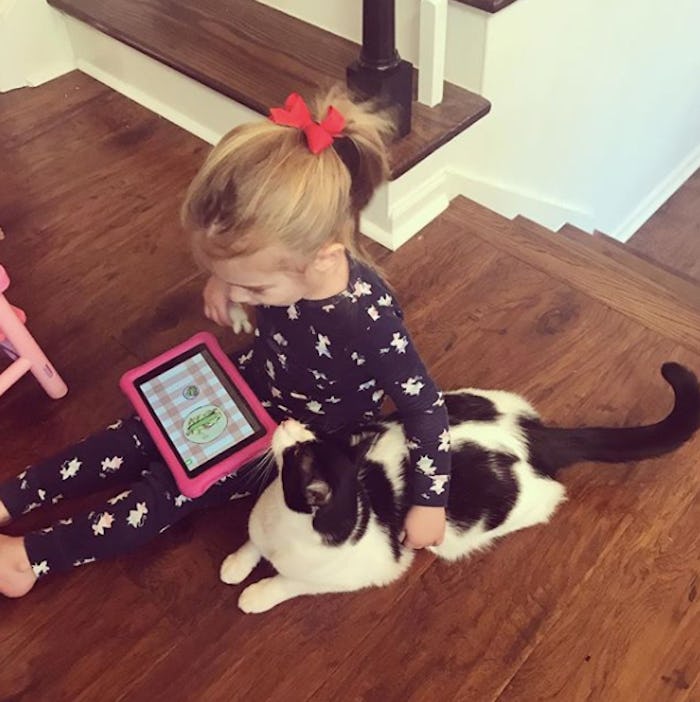We've all been there — your little one is begging and begging for a pet, but you just don't know if it's the right time. After all, it's pretty much guaranteed that you'll be doing all of the work, and what about safety and health concerns with animals around? You've heard stories from both sides, so making a decision gets a little confusing. So what age should a child get a cat? Surely there's some kind of guideline to follow.
"The bond between a child and their pet can be one of the most amazing learning experiences for a developing child, but it is very difficult to say what the 'proper' age is to introduce a pet to a young child," Michael Rueb, Operations Manager at the The National Cat Protection Society in Spring Valley, California, tells Romper. "A lot depends on the child, parents, and the specific cat you are looking to adopt. In a best case scenario, the child tends to help with feeding and maybe even the litter box, but will be growing and become distracted by their changing life, so we tend to focus more on the parents' readiness to adopt," notes Rueb.
"A child or adolescent means well, but is not capable of meeting all of the pets' needs," adds Russell Hartstein, certified dog/cat behaviorist and trainer in Los Angeles, California. "Which means," he tells Romper, "that you need to have time to dedicate to litter box training, cat training, behavioral issues, introductions to other dogs or cats or family pets, nutritional needs, enrichment, and socialization needs."
When it comes to selecting a cat that will do well with your family and young child, there are a few things to consider. While you might be considering getting a kitten to grow with your child, this is probably not the best idea. 8-week-old kittens become adult cats in less than a year, according to the American Humane Society, and because young children tend to be very active and may be too rough with fragile kittens, this can result in a fearful, skittish adult cat. For this reason, they recommend getting a cat over 2 or 3 years old for kids under the age of 6.
"You will really need to think about how your child will behave with the cat, your ability to supervise, and the cat's ability to tolerate typical child behavior," says Rueb. It can be difficult for many children under the age of 7 to understand how to behave around a cat, he says. "In these situations, the parents usually wind up having to supervise the child and cat interactions more frequently, which can be increasingly difficulty for most people to manage, time wise."
Leaving a child or even an adolescent alone with a new pet is not a good idea either. "Children need to be taught, just like the pet, how to interact, touch, and understand a pet and their emotions and body language," Hartstein explains, so you should always supervise your child and the new pet. "Seeking out a cat trainer or behaviorist can help get everyone up to speed regarding their new family member," he adds, "so it would be a valuable investment that will pay dividends for the lifetime of the pet and family."
Because so much depends on both the child and the cat's behavior, age, and temperament, there's no clear cut time on when adding a cat to your family is best. As Family Circle noted, cats can be incredibly loving and loyal pets, and great for children to be around. You just have to ensure that you and your family have the time to devote to a pet and its care.
Check out Romper's new video series, Bearing The Motherload, where disagreeing parents from different sides of an issue sit down with a mediator and talk about how to support (and not judge) each other’s parenting perspectives. New episodes air Mondays on Facebook.
